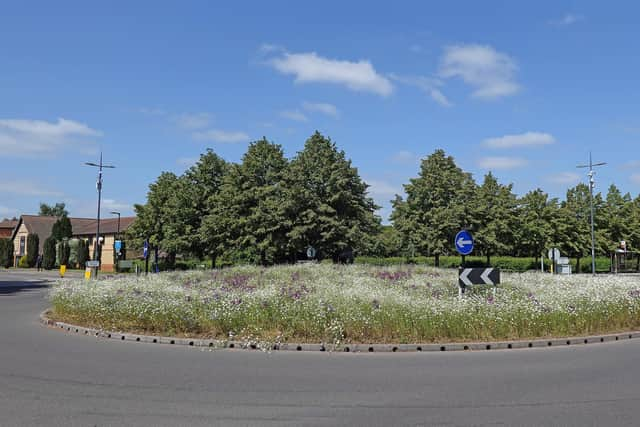University of Warwick's roundabout named best in Britain
and live on Freeview channel 276
One of the University of Warwick’s roundabouts has been crowned ‘Roundabout of the Year 2024’, recognising its impact on promoting biodiversity and protecting the local ecosystem of bees, butterflies, and insects.
Featured in ‘The Best of British Roundabouts Calendar 2024’, the roundabout features plant species including; Centaurea cyanus, Bellis perennis, Narcissus, Camassia, and Alliums.
Advertisement
Hide AdAdvertisement
Hide AdThe garden team at the University say they have worked to combine design with practicality so that the University’s planted areas are both aesthetically pleasing and enhance the local ecosystem.


Kelly Baker, grounds and gardens manager, who leads the grounds and gardens team at the University, said: "We are deeply honoured to receive the Roundabout of the Year 2024 title, especially for our role in enhancing biodiversity.
"By initiating re-wilding efforts on our campus, creating wildlife-friendly areas, and restoring natural habitats, we are contributing to the preservation of our ecosystem.
"Our strategic selection and arrangement of plants and flowers ensure a continuous display of bloom and foliage throughout the seasons, promoting ecological balance and integrating nature into our urban spaces."
Advertisement
Hide AdAdvertisement
Hide AdDr Dave Chandler, a lecturer in entomology and ecology at Warwick’s School of Life Sciences, added: “In many ways, the University campus represents much of modern Britain, where we need to manage green spaces in urban areas so that people in towns and cities can live alongside nature.
“Even in small spaces, such as roundabouts, the planting of diverse flowers, that attract insects, and other pollinators, are a crucial resource for the many species of bees and other insects that inhabit the campus and also act as food for a range of animals including birds and bats, which in turn affect the whole of the biodiversity in the campus area.”
Kevin Beresford, President of the Roundabout Association and creator of the Best of British Roundabouts series, has been on a twelve-month quest to discover ‘the nation's most extraordinary circular intersections’.
He said: “The University of Warwick roundabout stood out among the rest due to its unwavering commitment to environmental sustainability.
Advertisement
Hide AdAdvertisement
Hide Ad“Through meticulous planning and sustainable practices, this traffic circle serves as a reminder of the power of conservation and the beauty of nature in the UK.
"It is a vibrant testament to the harmonious coexistence of nature and human innovation.”